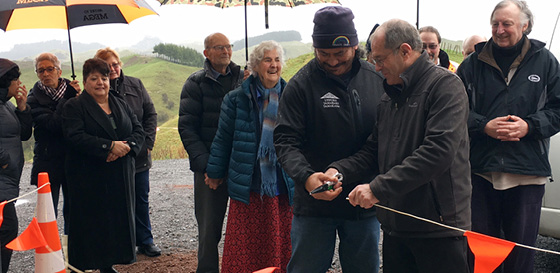New Raetihi water supply
News
The cutting of the ribbon. Photo supplied by Liz Brooker

6 August 2018
The Raetihi community spent Sunday celebrating the completion of one of New Zealand's newest, most sophisticated rural drinking water treatment plants.
Joined by Ruapehu District Council (Council) elected members, staff and contractors Veolia, an open day at the reservoir site provided the opportunity to learn more about the much-needed upgrade to the town's supply.
Costing $2,538,093, including a $1,517,348 subsidy from Ministry of Health, Mayor Don Cameron said an increase in filtration combined with a number of technology upgrades has resulted in residents now being supplied with, the best drinking water in the region.
Raetihi has probably now got one of the most sophisticated water treatment programmes for a small council, in a rural area. We have gone from the old three-step process to a nine-stage one.
As we all know, in 2013 there was a diesel spill in the Mākōtuku, that caused a lot of heartache and it was decided to immediately start work on an upgrade for the town's infrastructure and the water treatment plant.
Uenuku iwi chair Aiden Gilbert acknowledged the efforts being made to vastly improve the quality of Raetihi's drinking water.
Considerable resource has been applied to this and as tangata whenua we recognise the efforts of Council to address a serious issue in our community - the safety of our drinking water, and the health and well-being of our people.
There is a bit of a history and the diesel spill motivated Council and the community to get together and upgrade the drinking water.
Today as a result of minds, some great minds coming together in this area, we have got a Plant that I'm told is second to none in the country.
Contracted by Council to maintain the region's drinking water, wastewater and stormwater, Veolia Contract Manager Wayne Termaat said Raetihi residents are now being served by one of the most technologically advanced plants to come online in rural New Zealand this year.
I used to live here in Raetihi and it's especially exciting to see the stages and the advancement that has gone into the Plant.
We have gone from a system where effectively the water was abstracted out of the Mākōtuku River and went through a series of settling ponds before coming up to be dosed with a bit of chlorine to a high-tech, treatment system.
There are Ministry of Health drinking water standards we have to meet and this plant smashes all of them, effectively, we are now well under the required limits.
*End*
For more information, please contact
Anne-Marie Wescott
Environmental Manager
Ruapehu District Council
Phone: 07 895 8188 ext: 215 / 027 448 5300
Raetihi Water Treatment Plant background information:
Cost: The total cost of the Raetihi Water Treatment Plant upgrade and associated water main replacement works was $2,538,093 which includes a $1,517,348 subsidy from the Ministry of Health.
Capacity: Design flow is 1565m3 per day (1.56 Million Litres) - Raetihi normally uses between 700m3 and 1000m3 per day - future-proofing for growth.
UV Disinfection: There are two UV units at the Raetihi plant. Usually only one is running at any one time unless the plant needs to run at a higher flow rate. It also means that one unit can be offline for maintenance if needed.
Filtration: There are two filters at the Raetihi plant and usually both are online. However, one filter alone can sustain normal flows which means one can be turned off for maintenance if needed.
Filter composition: Coal (top, 500mm depth), Sand (middle, 500mm depth) and gravel (bottom, 200mm depth)
Drinking Water Compliance: The Raetihi Plant now achieves better than full compliance with drinking water standards for both Bacterial and Protozoa removal.
Raetihi Water Network: Since 1998 work has been undertaken to upgrade pipes as they reach their end of useful life and more than half of the township has been completed. In the last financial year, Council upgraded the pipe from the treatment plant to the township.

The cutting of the ribbon. Photo supplied by Liz Brooker